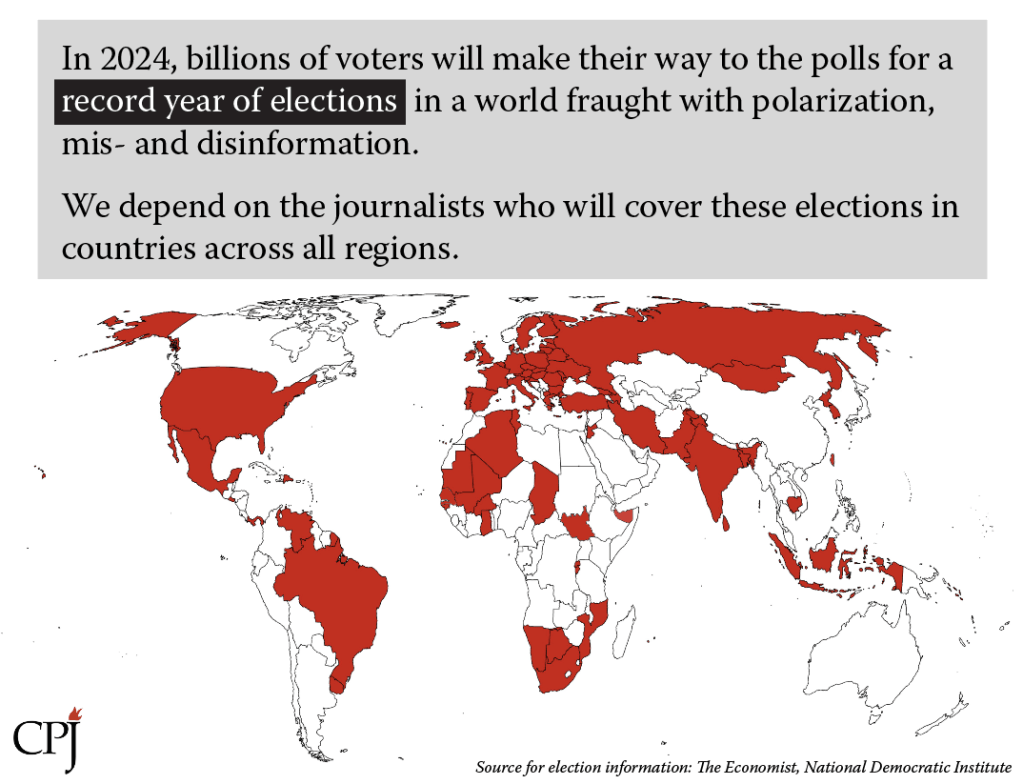This year, billions of voters will make their way to the polls for a record election year in a world fraught with polarization and mis- and disinformation. We rely on journalists to unearth the facts that help us make decisions about our leaders, and journalists are facing increasing challenges to doing this vital work.
In 2023, CPJ documented journalists around the world being targeted, threatened, beaten, detained, and harassed while covering elections. International journalists were expelled from countries holding elections. Media outlets were suspended and censored, and internet access was restricted.
January 6 marks the third anniversary of the violent assault on the U.S. Capitol, when rioters attempting to stop the certification of the election results attacked journalists and scrawled “Murder the media” on the Capitol doors. CPJ is already planning for the U.S. presidential election taking place later this year.
But first, on January 7, the people of Bangladesh, where press freedom faces serious challenges, will head to the polls. CPJ has worked extensively to defend journalists in Bangladesh and continues to monitor and advocate on their behalf.
⚡️ “Journalists, whose daily reports are the lifeblood of information flows that make dynamic economies possible, risk being silenced in an amplified government crackdown,” CPJ’s director of advocacy and communications, Gypsy Guillén Kaiser, wrote in The Diplomat with Robert F. Kennedy Human Rights’ Angelita Baeyens. They wrote that Bangladesh authorities “are systematically stifling local independent media in the run-up to the election.”
CPJ and our partners in the #KeepItOn coalition call on the Bangladeshi authorities to protect open and secure internet throughout the 2024 elections.
CPJ is striving to keep journalists safe. Here are tools to prepare for 2024 elections ⚠️
➡️ View our safety resources for covering the Bangladesh election (available in English and Bangla).
➡️ Review our comprehensive safety resources for covering elections.
➡️ Conduct a risk assessment for any potentially dangerous assignment.
- South African journalist Thomo Nkgadima charged with intimidation after photographing mayor’s home
- Turkish editor Furkan Karabay arrested for reporting on corruption trial of judiciary members
- Tunisian journalist Zied el-Heni arrested after criticizing commerce minister
- DRC journalists Pascal Mulegwa and Réné Mobembo attacked during election coverage, broadcaster ordered off air
Spotlight
Tajikistan’s media are in their worst state since the 1992-1997 civil war that followed the collapse of the Soviet Union, local journalists told CPJ in a new feature published today.
President Emomali Rahmon emerged victorious from that war, and now, after three decades in power, he has established himself as an absolute ruler with no tolerance for dissent. His bid to centralize control includes efforts to silence political opponents, human rights activists, and independent voices. Seven journalists are serving harsh sentences ranging from seven to 20 years in prison on charges widely seen as in retaliation for their work, independent media are struggling to survive, and Tajik journalists told CPJ that they work in a climate of fear and self-censorship. “We don’t know who might be next,” one journalist said. “Journalists fear saying anything,” said another.
Most of the journalists who spoke to CPJ were pessimistic about the prospects for Tajik journalism in the near or mid-term future. “I see my mission as maintaining independent journalism – I can’t say in a good condition – but maintaining it at least to wait for better days,” Abdumalik Kadirov, head of the independent trade group Media Alliance of Tajikistan, told a CPJ representative who visited Tajikistan in late 2023.
CPJ’s coverage of the Israel-Gaza war continues. As of January 4, at least 77 journalists and media workers had been killed since the October 7 start of the conflict. Of those 77, 70 were Palestinian, four Israeli, and three Lebanese. In the first 10 weeks of the war, the Israeli army killed more journalists than any other army or entity has in any single year.
🗯️ Failing to protect journalists in the Israel-Gaza war would be a resounding failure to protect press freedom and our collective right to be informed. CPJ calls on the international community to respond.
What we are reading
- In India’s embattled news media, women are fighting to be heard — Emily Schmall, The New York Times
- Unravelling the friction between CPIM and Kerala’s major media houses — Haritha John, Newslaundry
- How Verified Accounts on X Thrive While Spreading Misinformation About the Israel-Hamas Conflict — Jeff Kao, ProPublica, and Priyanjana Bengani, Tow Center for Digital Journalism and ProPublica
- The Impossibility of Reporting the Story of Gaza — Afnan Abu Yahia and Lila Hassan, The Nation
Explore our legal resources for journalists.
